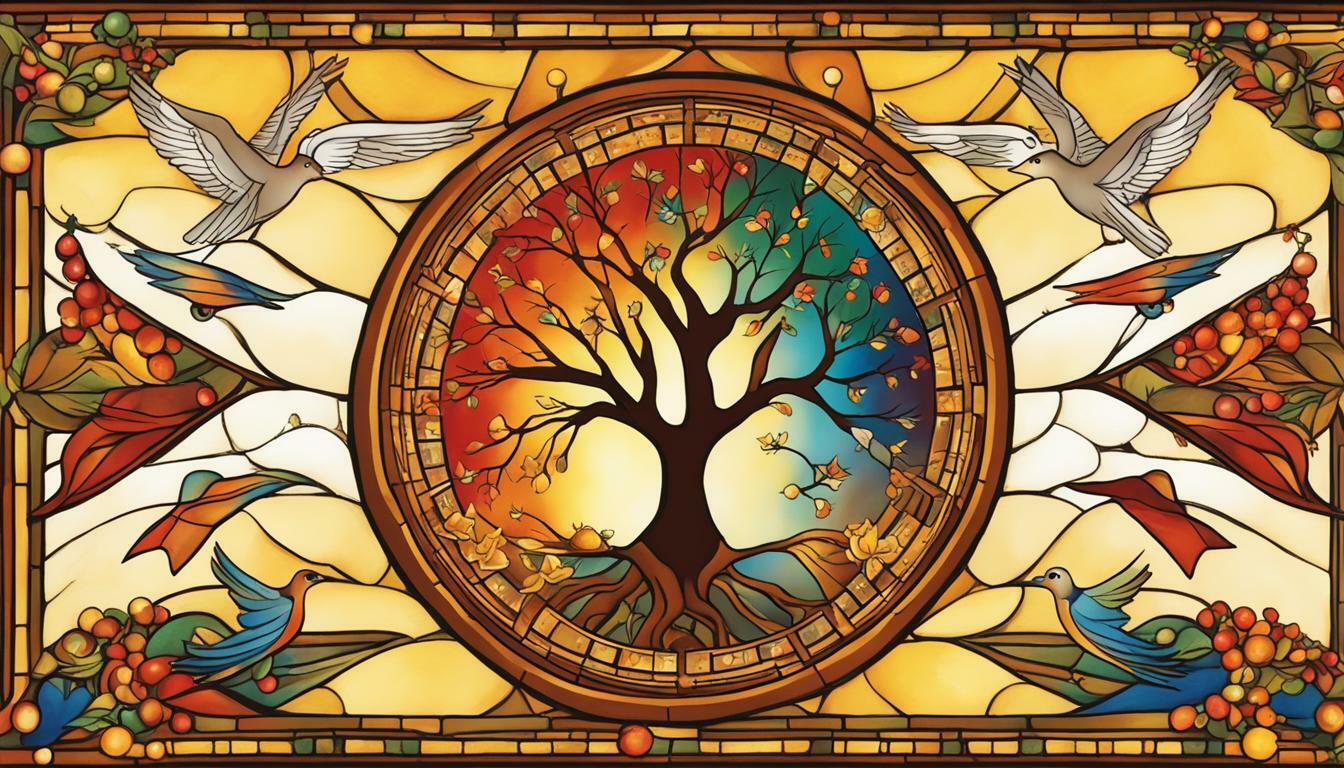The number 9 holds great symbolic meaning in the Bible, representing divine completeness and finality. In biblical numerology, it is associated with the fruits of God’s Holy Spirit, including faithfulness, gentleness, goodness, joy, kindness, longsuffering, love, peace, and self-control. Throughout the Bible, we find references to the number 9 in various chapters and events. It is prominently featured in the observance of the Day of Atonement and holds significance in the ministry of Jesus.
However, the number 9 is not solely associated with positive elements. In the Old Testament, it is linked to sorcery and evil practices. It is important to understand the context in which the number appears to grasp its full meaning.
One fascinating aspect of the number 9 is its connection to the Hebrew letter Tet or Teth. This letter symbolizes good versus evil and is often associated with fruitfulness and new life. It represents a dichotomy that resonates throughout the Bible, highlighting the ongoing battle between darkness and light.
In conclusion, the number 9 in the Bible carries profound symbolism. It signifies completion and conclusion, while also encompassing the spiritual aspects of the fruits of the Holy Spirit. As we explore further, we will delve into biblical verses and events that shed light on the deeper meaning and significance of the number 9 in the context of the Word of God.
Biblical References to the Number 9
The number 9 appears in various passages and events in the Bible, shedding light on its spiritual significance. One notable reference is found in the book of Exodus, where the plagues that struck Egypt were divided into three sets of three, with the ninth plague being complete darkness that lasted for three days. This darkness symbolized the judgment of God upon the Egyptians and the beginning of the end of their oppression.
Another significant mention of the number 9 is found in the New Testament, specifically in the Gospel of Luke. Jesus heals ten lepers, but only one, a Samaritan, returns to give thanks. Jesus acknowledges this and says, “Were not all ten cleansed? Where are the other nine?” This story reflects the theme of gratitude and highlights the importance of acknowledging God’s blessings.
“The number nine is associated with finality and completion. In the Bible, it signifies the fulfillment of God’s promises and the complete manifestation of His power and authority.”
Day of Atonement: A Symbolic Representation
The Day of Atonement, also known as Yom Kippur, is a holy day observed by Jews. It is a day of repentance and fasting, and it holds great spiritual significance. The Day of Atonement falls on the ninth day of the seventh month in the Hebrew calendar, emphasizing the number 9. This day represents the final opportunity for individuals to seek forgiveness and reconciliation with God before the year’s end.
The biblical interpretation of the number 9 in relation to the Day of Atonement reminds believers of the pivotal importance of repentance and the need for personal transformation. It serves as a reminder that true spiritual growth and renewal come from fully surrendering to God’s grace and recognizing His divine authority.
The Fruits of the Spirit and the Number 9
The number 9 is closely associated with the fruits of the Holy Spirit, such as love, joy, peace, and self-control. In the Bible, these fruits are seen as qualities that a believer should possess, representing the character of God. Each fruit signifies a divine completeness and a spiritual fullness that can only be achieved through a deep connection with God.
“But the fruit of the Spirit is love, joy, peace, forbearance, kindness, goodness, faithfulness, gentleness and self-control.” – Galatians 5:22-23
Love, the first fruit mentioned, encompasses the fullness of God’s love towards humanity. Joy represents a deep sense of happiness and contentment that comes from knowing and serving God. Peace brings a sense of tranquility and harmony, even amidst challenging circumstances. Self-control reflects the discipline and restraint needed to live a godly life.
The Significance of Number 9 in Biblical Numerology
In biblical numerology, the number 9 holds great significance. It symbolizes divine completeness or finality, emphasizing the completeness of God’s work and His perfect plan. The number 9 also represents the fruits of the Spirit, which demonstrate God’s complete and perfect character. It signifies that through the Holy Spirit, believers can experience the fullness and completeness of God in their lives.
“Be perfect, therefore, as your heavenly Father is perfect.” – Matthew 5:48
Jesus, who embodied the perfect example of love, joy, peace, and all the fruits of the Spirit, displayed the divine completeness that the number 9 represents. By striving to live a life that reflects these fruits, believers can align themselves with the divine plan and experience the fullness of God’s blessings.
In summary, the number 9 holds deep spiritual meaning in the Bible. It is closely connected to the fruits of the Holy Spirit, representing the qualities that believers should strive to possess. Through love, joy, peace, and self-control, followers of Christ can experience the fullness and completeness of God’s character. The number 9 also signifies divine completeness and finality, reflecting God’s perfect plan for His creation. By embracing the significance of the number 9, believers can seek to live a life that aligns with God’s purposes and receive the blessings that come from walking in His ways.
The Number 9 in the Old Testament
In the Old Testament, the number 9 is connected to sorcery and evil practices, highlighting its deeper symbolic meaning. This association can be seen in the book of Exodus, where Pharaoh’s magicians were able to replicate some of the miracles performed by Moses and Aaron. However, when it came to the fourth plague of flies, they failed, affirming the limitations of their powers. This significant event serves as a reminder that evil practices and sorcery are insufficient in the face of God’s divine authority.
Another instance of the number 9’s significance is found in the book of Deuteronomy, where it is mentioned in relation to rebellion and disobedience. Moses tells the Israelites that they had tested the Lord’s patience and provoked Him to anger nine times during their journey in the wilderness. This serves as a warning against the consequences of straying from God’s path and emphasizes the importance of obedience in maintaining a faithful relationship with Him.
Furthermore, the number 9 is associated with the corrupt practices of the Canaanites. In the book of Numbers, the Israelites are instructed to destroy the Canaanite cities and their inhabitants, as they were steeped in idolatry and wickedness. The city of Jericho, for example, is mentioned as having a wall that was six cubits wide and nine cubits high, symbolizing the stronghold of sin that needed to be toppled.
Intriguingly, the number 9 also emerges in the account of Balaam, a sorcerer hired by Balak, the king of Moab, to curse the Israelites. Instead, God intervened and Balaam blessed the Israelites on three separate occasions, pronouncing a total of nine blessings. This highlights the ultimate power and sovereignty of God, who foiled the plans of the sorcerer and turned curses into blessings.
The Number 9 and Jesus
The number 9 plays a significant role in the ministry of Jesus, showcasing its importance in the life of Christ. Throughout the New Testament, we can find references to the number 9 that shed light on its biblical significance. One such example is found in the Gospel of Luke, where Jesus performs a miraculous healing on a woman who had been suffering from a severe illness for 12 years.
“And a woman was there who had been subject to bleeding for twelve years, but no one could heal her. She came up behind him and touched the edge of his cloak, and immediately her bleeding stopped.” – Luke 8:43-44
In this passage, we see that the woman’s suffering had lasted for 12 years, a multiple of 3 (which symbolizes divine perfection) and 4 (which represents the earthly creation). By contrast, the number 9 represents completeness and conclusion. Through Jesus’ healing touch, the woman’s long-suffering came to an end, emphasizing the transformative power of the number 9 in bringing about divine wholeness and restoration.
Another instance where the number 9 is prominent in Jesus’ ministry is the feeding of the 5,000, as recorded in the Gospels of Matthew, Mark, Luke, and John. In this miraculous event, Jesus takes 5 loaves of bread and 2 fish and multiplies them to feed a large crowd. The number of baskets left over after everyone had eaten? Nine.
This detail holds spiritual significance, signifying that Jesus’ provision is abundant and complete, even in times of scarcity. It speaks to the comprehensive nature of God’s blessings and highlights the number 9 as a symbol of divine completeness and satisfaction.
The Hebrew Letter Tet and the Number 9
The Hebrew letter Tet represents the number 9, embodying the concept of good versus evil and new life in biblical interpretation. This letter holds great significance in understanding the symbolism of the number 9 in the Bible. According to biblical numerology, Tet is associated with the fruits of the Holy Spirit, which include faithfulness, gentleness, goodness, joy, kindness, longsuffering, love, peace, and self-control.
“But the fruit of the Spirit is love, joy, peace, patience, kindness, goodness, faithfulness, gentleness, self-control; against such things, there is no law.” – Galatians 5:22-23
These virtues, represented by the number 9, embody the completeness and perfection that God desires for His people. They guide believers in leading righteous lives and fostering positive relationships with others.
The Fruits of the Spirit and Number 9
The number 9, symbolized by the Hebrew letter Tet, aligns with the fruits of the Holy Spirit and highlights their importance in Christian faith. Each aspect of the number 9 represents a specific characteristic that believers should strive to cultivate in their lives.
“But the fruit of the Spirit is love, joy, peace, patience, kindness, goodness, faithfulness, gentleness, self-control; against such things, there is no law.” – Galatians 5:22-23
By embodying these qualities, individuals can find spiritual fulfillment and demonstrate the transformative power of God’s love in their actions and attitudes. The number 9 serves as a reminder of the divine completeness and perfection that can be achieved through the fruits of the Spirit.
Conclusion
The Hebrew letter Tet and the associated number 9 hold significant spiritual meaning in the Bible. Representing the fruits of the Holy Spirit and the battle between good and evil, the number 9 signifies divine completeness and finality. By understanding the symbolism behind this number, believers can strive to embody the virtues it represents and deepen their relationship with God.
Conclusion: The Symbolism of the Number 9 in the Bible
The number 9 in the Bible signifies divine completeness and finality, encapsulating various spiritual themes and concepts throughout the Scriptures. It holds significant biblical meaning, representing the fruits of God’s Holy Spirit, including faithfulness, gentleness, goodness, joy, kindness, longsuffering, love, peace, and self-control.
Biblical references to the number 9 are found in verses and events that emphasize its importance. For instance, the Day of Atonement, a key observance in Judaism, falls on the ninth day of the seventh month. Furthermore, the ministry of Jesus is also connected to the number 9, as he performed miracles and taught the principles of the kingdom of God, bringing divine completeness to his mission.
However, the number 9 also has negative connotations in the Bible. In the Old Testament, it is associated with sorcery and evil practices, serving as a reminder of the consequences of straying from God’s path. This duality is further emphasized by the Hebrew letter Tet or Teth, which symbolizes good versus evil, fruitfulness, and new life. This letter is connected to the number 9 and offers a deeper understanding of its spiritual significance.
In conclusion, the number 9 holds immense symbolism in the Bible. It represents divine completeness and finality, encompassing both positive and negative aspects. Through its association with the fruits of the Holy Spirit, biblical events, and the Hebrew letter Tet, the number 9 serves as a reminder of God’s presence, fulfillment, and the ultimate completion of His divine plan.
FAQ
Q: What does the number 9 symbolize in the Bible?
A: The number 9 in the Bible symbolizes divine completeness or finality. It is associated with the fruits of God’s Holy Spirit, such as faithfulness, gentleness, goodness, joy, kindness, longsuffering, love, peace, and self-control.
Q: Are there any biblical references to the number 9?
A: Yes, the number 9 appears in various biblical chapters and events, such as the Day of Atonement and the ministry of Jesus.
Q: How is the number 9 connected to the fruits of the Spirit?
A: The number 9 is connected to the fruits of the Holy Spirit in the Bible, representing the qualities of faithfulness, gentleness, goodness, joy, kindness, longsuffering, love, peace, and self-control.
Q: What associations does the number 9 have in the Old Testament?
A: In the Old Testament, the number 9 is connected to sorcery and evil practices.
Q: How is the number 9 related to Jesus?
A: The number 9 holds significance in relation to Jesus and his ministry, although further details will be discussed in the corresponding section.
Q: What is the significance of the Hebrew letter Tet in relation to the number 9?
A: The Hebrew letter Tet, associated with the number 9, symbolizes good versus evil, fruitfulness, and new life.
Q: What is the overall symbolism of the number 9 in the Bible?
A: The number 9 signifies completion and conclusion within biblical context, representing divine completeness or finality.




